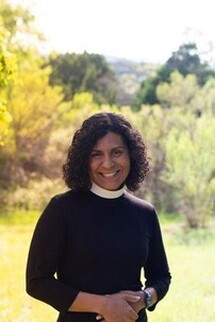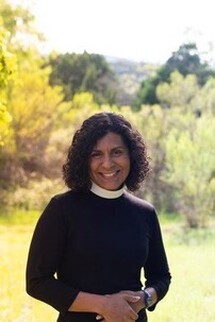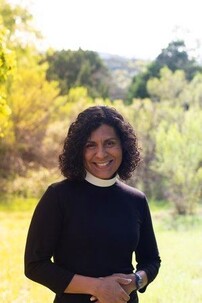 Stewardship of the Land You have often heard me say that we at St. John’s want to be good stewards of all of God’s blessings. Over 60 years ago, the Gracy Family gifted our congregation and the diocese the land to build our church buildings. The original church building has been expanded four times and a new sanctuary was built in 2004. The community garden and the labyrinth are the two additions to the land south of our parking lot. This part of our property has used as a baseball field and a soccer field. When the new sanctuary was built the zoning for this part of our property was changed. The City of Austin required that the area be zoned a water retention pond. This designation limits how this land can be developed. In the spring of this year, the neighborhood association invited St. John’s to a meeting with the Austin’s Park and Recreation Department. The neighborhood association called the meeting because they want the City to build more park space in the neighborhood. After the meeting, the City contacted St. John’s because they wanted to know if we would be interested in selling the vacant land on our property. In the Episcopal Church the property is owned by the Diocese. St. John’s cannot buy or sell property without the Diocese permission. The Diocese has informed us that we can continue the conversation with the City if St. John’s believes that our mission would be served by partnering with the City to develop the land into park space. The vestry working through the Growth Action Team has begun conversations about what we can do with this vacant land. There will also be follow up meetings with the City to learn more about a potential partnership. The vestry wants to be good stewards of the blessings from God. The land south of our property has been undeveloped for many years. The invitation from the neighborhood association has opened up possibilities for our vacant land. It has created the space to begin asking questions about our stewardship of this land: What is the best use of this land so that it can bear fruit for our congregation and for the community that we serve? Who should we partner with to make our dream a reality? I want to emphasize that no decisions have been made. We are beginning the conversation with each other to imagine what our vacant land can grow into. There are limitations to how this land can be developed, but with God’s help we can steward this land to be fruitful for God’s kingdom. Some of you have already participated in one of the two conversations we have held on the last two Sundays. There will be another conversation session on Monday, December 12 at 7pm on zoom click here . Please join in the conversation to imagine what we can do with God’s gift, and let me know if you are interested in being part of the team that works on this important project. I am excited to see what we can build together!
0 Comments
 Happy Thanksgiving! There is much for me to be thankful for this year. I am honored to serve St. John’s, an amazing faith community that continues to share its time, talent, and treasure. Each one of you has made it possible to have a mission filled year. The Action Teams adopted at our annual meeting in January have been very successful. As I shared in this year's Stewardship Letter, the Pastoral Care Team is revamping our method of staying connected within the parish. The Care Team is holding services at Buckner Villa on a quarterly basis. In addition, the Pastoral Care Team has expanded its card ministry to include get well and bereavement cards. The Growth Team walked the neighborhood. They met our neighbors and invited them to our church events. Thanks to them we had a successful pet blessing, Jamaica, and legal clinic. The Affordable Housing Team volunteered at Habitat for Humanity ReStore and partnered with Central Texas Interfaith to advocate the City Council to adopt a budget that includes a new minimum wage for city employees of $20/hour, $8 million in emergency rental assistance, $3.1 million for long term job training, and increased AISD funding for after school enrichment programs and parent support specialists. The Racial and Social Justice Team is not new at St. John’s. They continue to lead our community in our efforts to become a Beloved Community. This team sponsored special classes in June, pilgrimage opportunities in Austin African American history, celebrating Pauli Murray and collecting more that $700 for the Pauli Murray Scholarship Fund. I am grateful for St. John’s commitment to worship, learning, and celebration. The church’s liturgical teams – vergers, altar guild, choir, ushers, readers, technology specialists – work together to craft beautiful Sunday services, special feast days and a successful annual bishop’s visit. The Chistian Formation Team offers five separate christian formation opportunities to our congregation: lectionary bible study, special book study, Sacred Ground, bible study, and special classes. Your contributions to the Sunday coffee hour, convivio, and monthly birthday bash allows everyone to fellowship and celebrate. am grateful that there is a great respect for keeping our buildings and grounds in excellent shape so we can carry out our mission. Our campus continues to be cared for by our amazing Building and Grounds Ministry. I am grateful that our mission is reaching new people. Newcomers have been participating in our Sunday services. The Sunday attendance has increased by 20 percent this year. We have had 13 people baptized, four people confirmed, and several new families are attending our services regularly. In December we will have a Newcomers Class with at least one adult person interested in baptism. here is so much to be grateful for, but most especially for the love of Jesus Christ that allows us to be a people of hope. A hope that will sustain us today and always. A hope that will comfort us during challenging times. A hope that will embolden us to carry out our ministry knowing that Jesus is leading us to God’s eternal kingdom. Thank you all for allowing me to serve alongside you growing in discipleship. May we continue to bear fruit of love, joy, and peace. With Gratitude, Mother Minerva  How did a church festival get the same name as an island nation in the Caribbean?. The name itself is old and mysterious. Indigenous people living in the Jamaican islands already had a name for their home when Christopher Columbus first arrived. They called it Xaymaca. The word has been in use for a long time. That word has other meanings in Spanish. For one, jamaica is the name of the hibiscus flower. And the name of an herbal tea made from dried hibiscus. “Agua de jamaica” is the name for hibiscus tea in Spanish. For unkown reasons a jamaica (hah-MY-kah) has come to be known as a church fundraising event in the form of a fair or a street festival. Jamaicas are popular in Latin countries and in various parts of the US, particularly those with a Southwestern flavor. In some churches the event is linked to a celebration of Mexican Independence Day in the fall or Cinco de Mayo in the spring. Rosalinda Rodriguez observes that Jamaica is the word used for a kermes (festival) or fundraising sale for a charity: that word is used to say that it is like a fresh, voluntary activity, which can be as rewarding as giving a drink of water from that same plant ,since the flower of Jamaica has a beautiful red heart color and is used for several things: water, tea, quesadillas, jams. At St. John’s the Jamaica (Hah-MY-kah) festival has been a BIG fundraising event each fall (except during COVID). In years past, it was named Fall Festival or Fiesta, and is now called the Jamaica Festival. Everybody in the church pitches in and helps prepare, set up, run the various events, and clean up afterward. Food, drink, fun, and sweets are sold at modest prices. There is a Cake Walk. Watching the children have fun is part of the entertainment for adults. What to do:
When is the 2022 Jamaica Festival? Saturday, October 15th from 10 am – 5 pm. * Photo of Hibiscus flower, tea, and dried fruit from Wikipedia  I hope everyone is doing well here at St. John’s. I just wanted to thank all of you wonderful believers in Jesus for your continued support. It has meant so much to me the way you have reached out to me after the sudden passing of my beautiful bride Deborah. Your continued prayers have lifted me up and made it possible for me to move forward. Thank you so much. On another topic I want to congratulate you on your continued support and pledging in these very trying times. As part of the Stewardship committee and as a Vestry member I just want to say thank you. Whether you place monies in the plate or you pledge the gift is always welcomed. Your support allows us to continue our ministries here within the church and outside the church. Thank you again. I want to let you know what is happening with the Jamacia festival which will be on Oct. 15 from10am to 5pm. We are in the process of organizing the various activities which will take place. We will have music, food, games and a raffle. This should be lots of fun and I urge you to get involved. We will need many hands to bring the festival to fruition. If you are interested in getting involved you may reach out to me. My cell phone no is 512-7913823. I will do my best to with everyone help to make this a great event. Maria Angie is making us a flyer so be on the lookout. God Bless you all. Steve Kriechbaum  Labor Day gives us an opportunity to reflect on how our country treats its workers. In the 1800s when this federal holiday was created, the United States was at the height of the Industrial Revolution. Although many innovations and economic growth are touted as great benefits of this time, it is important to remember that many workers were exploited. “The average American worked 12-hour days and seven-day weeks in order to eke out a basic living. Despite restrictions in some states, children as young as 5 or 6 toiled in mills, factories and mines across the country, earning a fraction of their adult counterparts’ wages.”* Fortunately, people began to organize and fight for worker rights. The worker protections and rights that exist today are a result of their efforts: the 40 hour work week, minimum wage, and prohibition on child labor are a few examples. There have been several other periods in our history when workers have organized to continue to improve their working conditions and wages. During the pandemic many of us became alarmingly aware of the important role workers have in our community, calling some workers essential and heroes. I remember walking in my neighborhood and seeing thank you signs for the people who delivered food and other essential goods. Our newspapers and social media feeds were full of impassioned articles and stories of unsung heroes in our communities. People realized that people who do essential jobs – like nurses, teachers, paramedics, truck drivers, grocery employees, and garbage collectors – should be paid better wages. Unfortunately, as part of our desire to get back to normal, we have stopped talking about the value of essential work. Those thank you signs that were in my neighborhood have faded away. The parades cheering our hospital employees have ceased. However, the workers of today still need to know through words and actions that they are integral to the success of our communities and they should be treated with dignity and respect. As disciples of Christ we have promised that “we will strive for justice and peace among all people, and respect the dignity of every human being”.** Part of respecting people’s dignity is ensuring that they are paid a living wage. No one who works should be food insecure, unsheltered, or without access to healthcare. Workers today are experiencing some of the same unsafe conditions experienced by workers during the industrial revolution. Many are working 12 hour days six to seven days a week to make ends meet. These conditions do not reflect God’s vision for His people. Jesus tells us there is a cost to discipleship. Maybe we need to pay more for our goods and services. Maybe we need to be willing to pay higher taxes so that local, state, and federal employees can make a living wage. Maybe we need to stand with workers supporting their rights to organize so they can get better wages and safer working conditions. Workers' lives can improve when people of faith stand together with workers. The city of Austin and Travis County have both adopted a minimum wage of $20, which comes out to about $41,600 per year. It is still lower than the cost of living in Austin, but it is a $5 increase that will help many families have a better quality of life. The wage increase did not come about easily. Hundreds of hours by Central Texas Interfaith leaders who are Christians, Jews and Unitarian Universalists, labor union leaders, and members of other organizations was required to create the political will to increase city and county wages. And, there is a financial cost to all taxpayers. However, as Christians we believe that we are to stand for justice even when there is a cost to us. As you enjoy your Labor Day picnic or your three day weekend, do not forget the workers among us who will not be celebrating or taking time off. They will continue to stock our shelves, provide medical care for loved ones, and deliver our packages. The least we can do for them is offer a prayer of thanksgiving and stand with them when they call on their employers and our government to improve their wages and working conditions. *https://www.history.com/topics/holidays/labor-day-1 **BCP p. 305 |
|
St. John's Episcopal Church
11201 Parkfield Drive, Austin, TX 78758 (the corner of Parkfield Drive and Braker Lane) P. O. Box 81493, Austin, TX 78708-1493 512-580-0200 © St. John's Episcopal Church-Austin, Texas ALL RIGHTS RESERVED 2016-2024 |
 RSS Feed
RSS Feed
